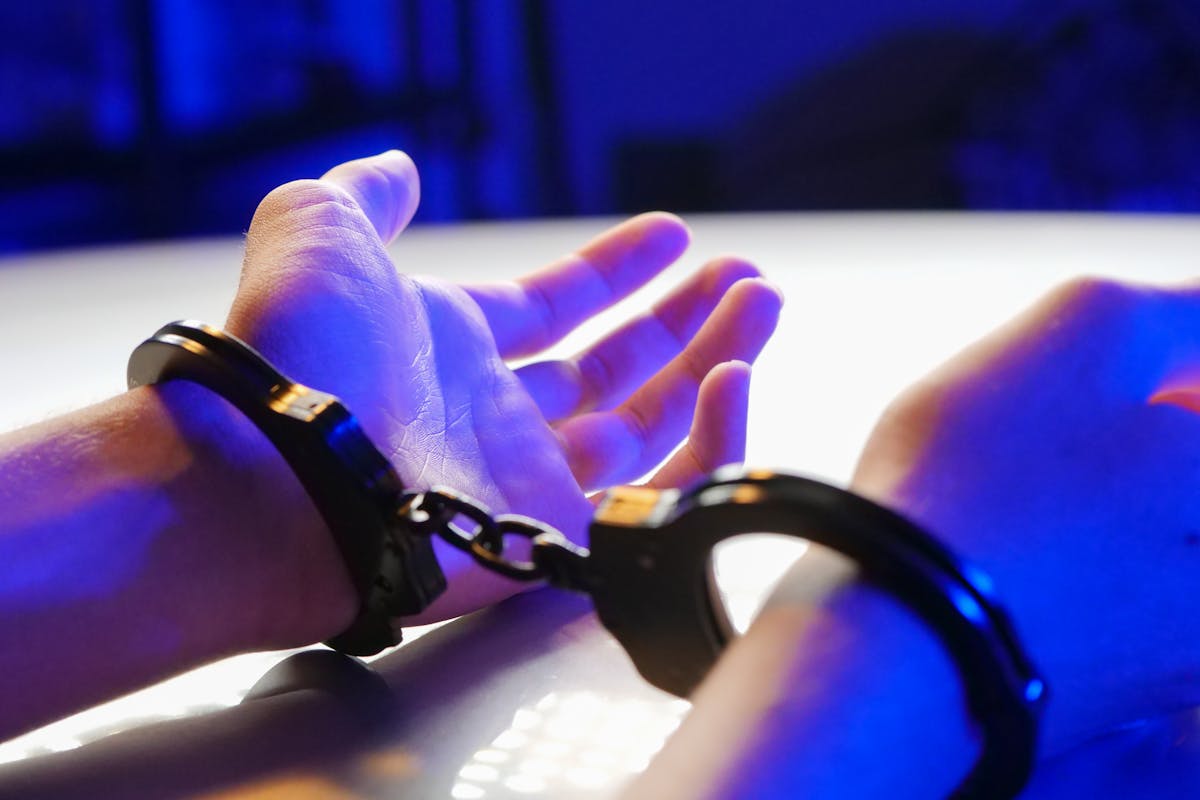False arrest is a grave infringement on an individual’s civil liberties, often leading to detrimental impacts that go beyond the immediate moment of illegal detention. It is the circumstance where a person is wrongfully held in custody, with the arresting authority lacking a legitimate warrant or sufficient probable cause. The implications of such actions are far-reaching, influencing not only the victim’s life but also the wider societal trust in the legal system. This raises important questions about how false arrest is defined, what its consequences are, and how it can be addressed and prevented.
Understanding the Term: False Arrest
In the domain of law enforcement, the term “false arrest” holds significant weight. This term is used to describe a scenario where an individual is unlawfully detained by either law enforcement or a private entity. The legal definitions and arrest procedures surrounding this concept are intricate and essential to understanding its implications.
False arrest is typically defined as the detention of a person without a legal justification. It is a violation of the Fourth Amendment, which protects individuals from unreasonable searches and seizures. The arrest procedures must be carefully followed by law enforcement to avoid any accusations of false arrest. For instance, an officer must have either a valid arrest warrant or probable cause to believe that the individual has committed or is about to commit a crime.
However, the concept of false arrest is not limited to law enforcement. Private entities, such as security guards or store owners, can also be held liable for false arrest if they detain someone without reasonable cause. Therefore, understanding the term “false arrest” requires an extensive analysis of both its legal definitions and the intricacies of arrest procedures.
Legal Basis of False Arrest
The legal basis of false arrest is rooted in the constitutional rights that protect individuals from unreasonable seizure and detention. An understanding of this concept not only exposes the severity of its breach but also sheds light on the recourse available to the victims. Consequently, with a thorough exploration into the legal remedies, one can effectively challenge such instances, ensuring the safeguarding of rights and the enforcement of justice.
Understanding False Arrest
Why is an awareness of false arrest so important? It is essential because it touches profoundly on our civil rights and personal freedoms. False arrest violates an individual’s right to liberty, often leading to wrongful detention, tarnishing reputations, and causing psychological trauma.
Recognizing false arrest helps us identify when our civil rights are being infringed upon. To grasp this concept fully, one must realize that an arrest is considered false when law enforcement or any individual restrains a person’s freedom without probable cause or a warrant. The key here is the lack of justifiable reason. An individual is wrongfully detained if held without due process of law or without any reasonable suspicion of having committed a crime.
The gravity of false arrest lies in its capacity to erode trust in legal institutions, subtly undermine societal norms, and potentially encourage an environment where abuse of power persists. Comprehending its dynamics enables citizens to guard their civil rights fervently and contributes immensely towards fostering a just society. It is, consequently, imperative that we appreciate false arrest not merely as a legal terminology but as an issue affecting our fundamental liberties.
Legal Remedies Available
Having understood the implications of false arrest, it becomes necessary to explore the legal recourse available for individuals subjected to such an unjust situation. At the crux of these remedies are compensatory and punitive damages, two legal terms that define the essence of redress for false arrest victims.
Compensatory damages are monetary awards granted to a victim to cover actual losses incurred. These could include lost wages, damage to reputation, emotional distress, or legal expenses. This compensation is aimed at restoring the victim to the position they would have been in if the false arrest had not occurred.
Punitive damages, on the other hand, are not designed to compensate the victim but to punish the offender and deter similar conduct in the future. The imposition of punitive damages serves as a strong message to law enforcement authorities, emphasizing the importance of upholding individuals’ rights and the severe legal repercussions of violating them.
Both compensatory and punitive damages play a pivotal role in providing relief to victims of false arrest, underscoring the importance of the legal system in addressing such abuses of power.
Difference Between Arrest and False Arrest
In understanding the distinction between an arrest and a false arrest, it is essential to first explore the basic definition of both terms. An arrest refers to the lawful apprehension of a person by law enforcement, for alleged criminal activity, following established arrest procedures. On the other hand, a false arrest is the unlawful restraint of a person’s freedom of movement, typically by someone who misrepresents themselves as a law enforcement officer or misuses their power in that capacity.
The difference between these two terms is primarily based on the legality and propriety of the action. The following points further clarify this distinction:
- The legitimacy of law enforcement authority: Arrest is conducted by a person with legitimate law enforcement power, following due procedures, while a false arrest lacks lawful authority or is conducted without following proper procedures.
- The respect of civil rights: During an arrest, the person’s civil rights must be upheld, whereas in a false arrest, these rights are often violated.
- The basis of the arrest: A lawful arrest is based on probable cause or an arrest warrant, while a false arrest is typically based on personal bias, prejudice, or unfounded suspicion.
In essence, the difference lies in the respect for legality, civil rights, and proper arrest procedures.
Common Instances of False Arrest
In understanding the concept of false arrest, it is essential to examine common instances where such occurrences materialize. Key among these are misidentification by witnesses, unlawful police detention, and inaccurate crime reports. Each of these scenarios contributes considerably to the prevalence of false arrest and underscores the need for acute vigilance and improved procedural accuracy in law enforcement.
Misidentification by Witnesses
The phenomenon of witness misidentification considerably contributes to instances of false arrest, a grave concern in our justice system. At its core, the issue revolves around the reliability of eyewitnesses and the identification procedures applied during criminal investigations.
Eyewitness reliability is often compromised by several factors including stress, poor lighting, and the brief duration of the crime. Despite their best intentions, witnesses can be misled by their own cognitive biases or external influences, leading to misidentification. This vulnerability can be exploited, inadvertently or otherwise, through faulty identification procedures. Police lineups or photo arrays, for instance, may be unintentionally suggestive, influencing a witness to identify a particular individual.
Several key points deserve to be emphasized: – Eyewitnesses, while well-meaning, are not infallible and can easily make mistakes in identification. – Identification procedures need to be carefully controlled to avoid unintentionally suggesting a particular suspect. – Misidentification can lead to innocent people being falsely arrested, undermining public trust in the justice system.
Hence, it becomes imperative for the justice system to implement safeguards to minimize the risk of witness misidentification leading to false arrests. This includes refining identification procedures and educating the public about the fallibility of eyewitness testimony.
Unlawful Police Detention
Steering through the murky waters of unlawful police detention, we encounter a prevalent form of false arrest. This issue, often shrouded in confusion, is a clear violation of civil rights and a manifestation of police misconduct.
Unlawful detention happens when an individual is held in custody without probable cause or outside the legal parameters. This includes detaining someone without an arrest warrant, without evidence of a crime, or beyond the legal time limit. In summary, the police are overstepping their legal authority, often leading to repercussions for innocent citizens.
The implications of unlawful detention are far-reaching, from the erosion of public trust in law enforcement to the severe psychological and physical impact on the individual detained. Additionally, it undermines the very foundation of the justice system, which is predicated on fairness, due process, and the presumption of innocence.
Our society must not condone such actions, and it is incumbent upon us to demand accountability and transparency from our law enforcement agencies. Consequently, any individual who believes they have fallen victim to unlawful detention should take immediate action, seek legal counsel, and uphold their rights.
Inaccurate Crime Reports
Another manifestation of false arrest, often overlooked, is the domain of inaccurate crime reports. These reports, flawed by human error or intentional misrepresentation, can lead to unjust arrests. Such instances underline the importance of accurate reporting in maintaining the integrity of our justice system.
Inaccurate reporting can occur in several ways:
- Incorrect Identification: Often, victims or witnesses may incorrectly identify a suspect due to stress, fear, or confusion, leading to a false arrest.
- Falsified Reports: Sometimes, law enforcement officers may intentionally manipulate crime statistics or fabricate reports to meet certain targets or create a false narrative.
- Misclassification of Crimes: Crimes may be inaccurately classified, either due to a lack of understanding or to hide the true extent of certain crimes.
These inaccuracies not only distort crime statistics but can also result in innocent individuals being falsely accused and arrested. As a result, it is paramount that accurate reporting be emphasized in all stages of the justice process. By doing so, we can prevent false arrests and uphold the principle of ‘innocent until proven guilty’.
Impact of False Arrest on Victims
Experiencing a false arrest can lead to significant ramifications for victims, both psychologically and practically. The emotional trauma endured by victims is intense and often long-lasting. Feelings of fear, anxiety, and helplessness are common, and these emotions can persist long after the arrest, permeating every aspect of the victim’s life, from personal relationships to professional endeavors.
Moreover, the social stigma associated with an arrest, even when unwarranted, can be incredibly damaging. Society often views those who have been arrested with suspicion and mistrust, regardless of the circumstances. This stigma can lead to isolation, loss of reputation, and can even impact employment opportunities. Even after the false nature of the arrest is revealed, the stain on one’s social standing may not be easily removable.
The practical implications of a false arrest are equally devastating. Loss of income, legal fees, and other related expenses can put a severe financial strain on victims. Additionally, false arrests can lead to lost time, both regarding being detained and the subsequent legal proceedings. The overall impact of a false arrest on victims is, as a result, profound and multi-faceted.

Legal Recourse After False Arrest
When a victim’s liberty is unjustly compromised due to false arrest, it is vital to understand that there are legal remedies available. These legal pathways are designed to uphold civil rights and guarantee police accountability, consequently deterring law enforcement authorities from arbitrary or unreasonable arrests.
The first step in seeking legal recourse is filing a complaint with the police department. This initiates an internal investigation into the incident, holding officers accountable for their actions.
Civil litigation is another avenue for redress. If the falsely arrested individual can prove that their rights were violated, they may be able to recover damages for physical and emotional distress, loss of income, and legal fees.
Finally, in cases where the false arrest constitutes a pattern of misconduct, the victim might consider advocating for systemic changes within the police department to prevent further incidents.
- Filing a complaint
- Civil litigation
- Advocacy for systemic changes
These legal remedies not only offer the falsely arrested person a chance at justice but also serve as a deterrent against future violations. As a result, understanding these options is significant in the fight against false arrest and the preservation of civil rights.
Tips to Avoid False Arrest
While understanding legal recourse after a false arrest is important, taking preventative measures to avoid such an unfortunate event is equally essential. It requires not only individual vigilance but also a robust legal awareness.
The first and most effective preventive measure is to know and understand your rights. Being well-versed in your legal rights during encounters with law enforcement can notably reduce the risk of a false arrest. This includes understanding when law enforcement has the right to detain or arrest you, and how to appropriately exercise your right to remain silent and your right to an attorney.
Another preventive measure pertains to the manner of interaction with law enforcement. Always maintain a calm and cooperative demeanor, even when asserting your rights. Aggressive or confrontational behavior can escalate the situation, increasing the risk of false arrest.
Lastly, always document encounters with law enforcement as soon as possible after they occur. This could be by writing down the events, recording visible injuries, or securing names of potential witnesses. While this may not prevent a false arrest from occurring, it may provide vital evidence in challenging the arrest later.
Real-life Examples of False Arrest
In the domain of law enforcement, false arrest scenarios are unfortunately not uncommon. They have substantial consequences on the lives of individuals involved and can drastically alter public perception regarding the credibility of the criminal justice system. To illustrate this, let’s explore three real-life case studies of false arrest.
- Case Study 1: The Central Park Five: Five teenagers were wrongly convicted for a brutal attack in New York City, spending years in prison. Their exoneration came too late to prevent the severe personal and societal damage.
- Case Study 2: Richard Jewell: Initially hailed as a hero for discovering a bomb during the 1996 Olympics, Jewell was later wrongfully accused and arrested. His case is a poignant example of a rush to judgment.
- Case Study 3: The Duke Lacrosse Case: Three Duke University students were falsely arrested and charged with sexual assault. The charges were later dropped, but not before it had a significant impact on their lives and reputations.
These cases underscore the lasting damage false arrests can inflict. They serve as reminders of the importance of due process, fair investigation, and the potential perils of public perception in influencing justice.
Frequently Asked Questions
Can a False Arrest Lead to Criminal Charges Against the Arresting Officer?
Yes, a false arrest can potentially lead to criminal charges against the arresting officer. This act can be considered false imprisonment, which carries legal consequences including potential criminal charges, depending on the jurisdiction and circumstances involved.
What Is the Average Settlement Amount in False Arrest Cases?
The average compensation in false arrest cases can vary greatly, depending on settlement factors such as severity of violation, damages incurred, and jurisdiction. However, amounts typically range from $5,000 to $100,000, with higher outliers existing.
How Long Does a False Arrest Lawsuit Typically Take?
A false arrest lawsuit timeline varies depending on case specifics. Typically, it may take 1-3 years, factoring in investigations, legal process stages, and court availability. However, complexities or negotiations can extend this expected timeframe.
Are There Any Specific Laws Protecting Minors From False Arrest?
Yes, specific laws do exist to safeguard minors from false arrest. These minor protections place stringent legal accountability on law enforcement, emphasizing careful handling and ensuring rights are not violated during interactions with the justice system.
Can Previous Criminal Records Impact a False Arrest Claim?
Previous criminal records do not inherently impact a false arrest claim. Everyone’s civil rights are protected under law, and any breach allows for legal remedies, regardless of their past. Each case is evaluated on its own merits.





